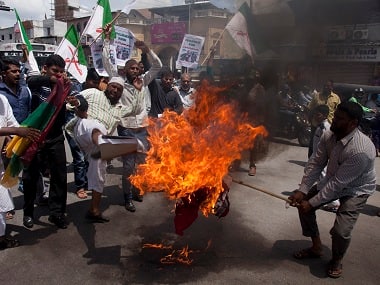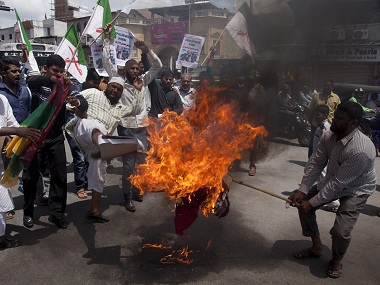A slap on the wrist by the United Nations Human Rights Commission (UNHRC) seems to have forced a change in India’s Rohingya policy. India had earlier announced that it will act “as per law” and deport around 40,000 illegal immigrants who are located in different parts of the country. Around 14,000 more are reportedly registered with the United Nations High Commissioner for Refugees. On Monday, however, Union Minister of State for Home Kiren Rijiju told The Hindu that there are no plans yet to push them out. He added that states have only been asked to identify the illegal immigrants and “act per procedure”. The minister also appeared extremely touchy about criticism from the human rights body. The security threat posed by the Rohingya influx is well documented, and we will explore it further. But this climbdown is commensurate with India’s image as a “soft State”. It suggests that India remains vulnerable to coercive behavior when it comes to even non-negotiable issues such as national security. All it needs for India to yield is just the just the right amount of push. [caption id=“attachment_4036255” align=“alignleft” width=“380”]  Muslim groups burn effigies protesting against the persecution of Myanmar’s Rohingya. AP[/caption] Liberals and human rights bodies have framed the argument exclusively within the parameters of humanitarian crises. It has been alleged that India is being insensitive in ignoring the plight of the Stateless Rohingya and that its claim of being a liberal democracy is hollow. UNHRC chief Zeid Ra’ad Al Hussein has deplored India’s plan to deport the illegal immigrants who have fled due to violence in Myanmar, and reminded India of its “obligations of due process and the universal principle of non-refoulement”, and has curiously tied it with “rise of intolerance towards religious and other minorities in India”. This isn’t the first time liberals have tried to portray morality as a compulsion higher than national security, and tried to showcase India, against all evidences, as a “lesser democracy”. This is a faux argument. The biggest moral responsibility of any democratic State lies not towards illegal immigrants, but its own citizens. Ensuring their safety, security and upholding the sanctity of its borders is the primary duty of any government. This position enjoys constitutional support. Besides, this attempt to highlight the religious identity of Rohingya Muslims and suggest that they are somehow being discriminated against by a “Hindu majority government” is not only from the UNHRC playbook, but some Opposition politicians and rights activists in India are also advocating this narrative. This focus on religious identity shifts the goalposts and pushes the debate to the realm of “persecution of minorities”, from where discussions on national security — which should be the first concern — are easily stifled. It’s strange that human rights bodies sermonise India, a country that has always believed in an open border policy and never shied away from taking refugees in. And unlike the West, India has also never sought to create moral capital out of sheltering refugees. The influx of Syrian refugees triggered an almighty pushback from western civil societies, and in many cases, resulted in political prominence of Right-wing forces. Some liberal democracies such as Germany, which laid out the carpet for refugees, later had to retract. In India, however, the refugee influx has happened over many years, largely illegally, without any vetting, and it has greatly changed the demographic matrix of the border states. Sanjeev Tripathi, former head of Research and Analysis Wing (RAW), points out in Carnegie India, “An analysis of population growth and demographic statistics for Bangladesh and India in the last four censuses of 2011, 2001, 1991, and 1981 suggests that their number exceeds 15 million. The influx of such a large number of illegal Bangladeshi immigrants, particularly in the border states, has proved to be a huge challenge for India, with serious implications for its resources and national security. It has substantially contributed to changing the demographic pattern in the northeastern states, where locals feel overwhelmed by outsiders. This has adversely affected their way of life and led to simmering tension between the two sides. It has also fueled insurgency.” This influx gave rise to twin political divergences. While central security agencies and the Union government saw it as a security threat and a huge strain on resources, for political leaders the influx paved the way for identity politics. To complicate issues, India’s attempts to seal the border have proven ineffective, and Bangladesh has not paid heed to India’s requests to take them back. The gravest consequence of this influx lay in national security. When Dhaka started taking action against Harkat and Jamaat terrorists, they readily crossed over and melted into India’s border states. The threat posed by the Rohingya influx is multifarious. It is to be noted that Jaish-e-Muhammad chief Masood Azhar and Lashkar-e-Taiba founder Hafiz Saeed, both notorious terrorists who operate out of Pakistan and exclusively target India, have come out in support of the Rohingya. The threat arising from this backing can be divided into two parts: Ideological and operational. Operationally, the Arakan Rohingya Salvation Army (ARSA), which launched a series of coordinated attacks on Myanmar’s 30 police posts and army bases on 25 August, thereby sparking the latest round of violence, receives active help from these Pakistan-based terrorist groups, who in turn find ready recruits among the Rohingya. As Nirupama Subramanian has written in The Indian Express, “India’s national security fears are based on intelligence reports linking the radical Arakan Rohingya Salvation Army to the Lashkar-e-Taiba; key individuals in ARSA, or its front organisations such as Rohingya Solidarity Organisation, are allegedly close to Hafiz Saeed. RSO has a Pakistan chapter, and the Jamaat-ud-Dawa front Falah-e-Insaniyat had a presence in Rohingya refugee camps in 2012.” This heady cocktail poses a grave challenge for India, which is already battling terrorism and insurgency in its northern and north-eastern border areas. The other challenge is ideological. In his article for JeM’s house magazine al-Qalam, Masood Azhar exhorted all Muslims to take up the Rohingya cause and warned Myanmar, as Praveen Swami writes in The Indian Express, to prepare “for the thudding sound of the footsteps of its conquerors”. “The entire Muslim ummah is feeling the pain of the Muslim nation. It is because of the sacrifices of the Myanmar Muslims that the ummah is waking up and we are seeing this new awakening among the Muslims of the world.” The Rohingya movement is essentially political, seeking to carve out a separate Muslim state from the Buddhist-majority nation, and it has its moorings in a pan-Islamic movement. For India, a country which has witnessed repeated instances of communal violence, this presents a particularly volatile challenge. Kolkata, for instance, witnessed a huge rally by Muslim organisations on Monday in favour of Rohingya, and Prime Minister Narendra Modi was exclusively targeted for planning to deport them. As India Foundation research fellow Rajat Sethi is quoted in The Print, “In a strategic scenario analysis, it is always the worst case that determines the policies of the security establishment. It is in this regard that the Indian State should be careful in dealing with the issue of Rohingya migrants.” India must show sensitivity and uphold the standards of humanitarianism, but that cannot come at the cost of national security and instability to our social fabric. Some Rohingya could be settled, but this requires formulating policies and strict vetting, so that apprehensions could be properly addressed.
It has been alleged that India is showing insensitivity in ignoring the plight of the stateless Rohingyas and that its claim of being a liberal democracy is hollow.
Advertisement
End of Article


)




